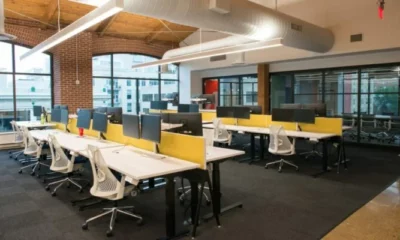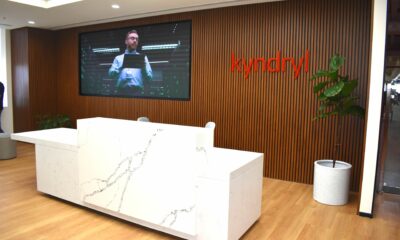Report
Office leasing sees over 10 pc rise in first half of 2018: CBRE report


Delhi-NCR figures among leaders of growth
That the realty sector is seeing an upsurge post-RERA and GST is being reflected in one report after the other. A latest study by CBRE South Asia shows that office leasing activity during the first of this calendar year saw 10 per cent rise and further good news is that Delhi-NCR was among the leaders of that growth. The region along with Bengaluru, Mumbai and Hyderabad accounted for more than 80 per cent of this supply addition.
Office leasing activity across top nine markets in the country rose by more than 10 per cent with leasing crossing 20 million sq. ft. during the first half of 2018, according to the findings of the India Office MarketView – Q2 2018 report, released by real estate consultancy firm CBRE South Asia on July 16.
Bengaluru along with Delhi-NCR, Hyderabad and Mumbai led the leasing activity, it added.
The report said the Indian economy struck a high note with a two-year high of 7.7 per cent during the quarter ended March 2018. The upward momentum, it said, was largely attributed to the construction and manufacturing sectors, which grew by 11.5 per cent and 9.1 per cent respectively.
About 16 mn sq. ft. of supply was added – an increase by more than 40 per cent in H1 2018, when compared with H1 2017. Four cities – Bengaluru, Mumbai, Hyderabad and Delhi-NCR – accounted for more than 80 per cent of this supply addition, followed by Chennai.
Anshuman Magazine, Chairman, India and South East Asia, CBRE said, “Corporates are likely to remain cost-sensitive, develop workplace strategies for efficient space utilisation, which will impact the office space absorption. We foresee pre-commitments in quality, cost-effective projects nearing completion which will have a significant impact on office leasing activity across key cities.”
Tech corporates (with a share of 31 per cent) drove office space take-up in the country during Q2 2018. They were followed by co-working/business center firms (17 per cent), owing to the continued expansion of key co-working operators across almost every major city of the country. These operators took up both primary and secondary spaces in primarily core locations. The other sectors such as banking, financial services and insurance (BFSI) (14 per cent), engineering and manufacturing (8 per cent), and e-commerce (6 per cent) also contributed to the increase in leasing activity.
The share of the tech sector declined from 33 per cent to 28 per cent on a half-yearly basis, in comparison of H1 2018 with H1 2017. The decline was offset by the rise in the share of the other sectors. The share of co-working / business centre operators doubled from just 5 per cent in H1 2017 to about 10 per cent in the review period. In addition, e-commerce firms remained active, with their share rising from 2 per cent in H1 2017 to about 10 per cent in H1 2018.


Anshuman Magazine
Chairman, India and South East Asia, CBRE
“Corporates are likely to remain cost-sensitive, develop workplace strategies for efficient space utilisation, which will impact the office space absorption.”


MD, Advisory & Transaction Services, CBRE
“We expect infrastructure initiatives (such as completion of highways and introduction of Mass Rapid Transport System (MRTS) services, etc.) to significantly influence and drive occupier preferences in the coming quarters.”
Commenting on the findings of the report, Ram Chandnani, Managing Director, Advisory & Transaction Services, India, CBRE South Asia Pvt. Ltd., said, “Office leasing activity is expected to remain stable in the short term, backed by corporates looking to expand or consolidate their operations. Across all cities, rising traffic congestion and public infrastructure have become key decision-making parameters significantly impacting location strategies of occupiers. We expect infrastructure initiatives (such as completion of highways and introduction of Mass Rapid Transport System (MRTS) services, etc.) to significantly influence and drive occupier preferences in the coming quarters.”
Continuing the trend, office space take-up was dominated by small- and medium-sized transactions. Small-sized transactions (less than 10,000 sq. ft.) accounted for about 44 per cent of the transaction activity in the quarter, while mid-sized transactions (ranging between 10,000 sq. ft. and 50,000 sq. ft.) held a 42 per cent share. The share of large-sized deals (greater than 100,000 sq. ft.) rose marginally from 4 per cent in the previous quarter to about 5 per cent.
Bengaluru, followed by Delhi-NCR, dominated large-sized deal closures, with a few such deals reported in Hyderabad, Mumbai, and Pune. Sectors such as technology, co-working / business centers, e-commerce and engineering and manufacturing dominated large-scale deal closures. Key transactions included space take-up by corporates / operators such as Atlassian, Genpact, Landis+Gyr and Smartworks.
The following are the city-wise highlights:
Delhi-NCR
- Gurgaon dominated leasing activity in the city
- Leasing activity was primarily driven by co-working / business center operators, followed by tech, research, consulting and analytics, and BFSI firms.
- Sustained occupier interest resulted in the DLF Cybercity, NH-8 and Noida Expressway accounting for almost half of the region’s leasing activity. A majority of the deals were closed in secondary spaces
- Rental growth limited to select IT and SEZ developments in Gurgaon
Mumbai
- Leasing activity was primarily driven by co-working / business center operators, followed by BFSI firms.
- The supply addition was witnessed in Western Suburbs 1 and BKC periphery
- Stable rental values across all micro-markets
- Primary leasing continued to dominate space take-up, owing to ample availability of space in recently completed investment-grade developments.
Bengaluru
- Sustained occupier interest led to a 2-3 per cent growth on a quarterly basis across non-SEZ buildings in CBD, EBD, PBD and ORR.
- Tech corporates dominated leasing activity, followed by co-working / business center operators, pharmaceuticals/healthcare companies, and engineering and manufacturing corporates.
- Supply addition was witnessed in the form of medium-to-large-sized non-SEZ developments in EBD, NBD, ORR and PBD, along with a medium-sized SEZ development in ORR
Chennai
- Quarterly leasing activity witnessed a marginal increase
- Tech corporates continued to lead demand, followed by media, infrastructure, real estate, logistics and BFSI firms
- Several medium-sized deals by tech, BFSI and co-working / business center operators were reported in OMR Zone I, OMR Zone II, Guindy and MPH Road.
- Supply addition in the city consisted of two small-sized non-IT developments in OMR Zone I and two medium-sized SEZ blocks in existing developments on MPH Road and GST Road
- Rents in IT buildings increased by about 1-3% on a quarterly basis in OMR Zone I and Ambattur
- The rental increase was similar (about 1-3%) in Off-CBD due to low vacancies and sustained corporate interest.
Hyderabad
- Significant increase was witnessed in leasing activity this quarter
- Supply addition increased on a quarterly basis with the completion of one medium-sized SEZ development in Raidurg and two medium-sized IT developments in Nanakramguda and Haffezpet in Extended IT Corridor.
- Due to supply influx and culmination of pre-commitments, office space take-up rose on a quarterly basis during the review period
- Tech companies led leasing activity, followed by e-commerce and healthcare firms.
- Rental values increased by 6-8% across all micro-markets, resulted in occupier interest
Pune
- Leasing activity increased on a quarterly basis in the cityalongwith supply addition
- Tech firms continued to dominate space take-up, followed by engineering and manufacturing companies
- Leasing activity was driven by primary space take-up and was mainly concentrated in SBD Kharadi, followed by PBD
- Limited space availability and sustained occupier interest increased rental values by about 1-3% and 6-8% on a quarterly basis.
Kolkata
- The city witnessed supply addition in the form of a small-sized IT development Rentals remained stable across all micro-markets
- Demand was largely driven by occupiers from engineering and manufacturing firms, followed by tech and co-working / business center operators
- Rental values remained stable during the review period across all micro-markets.
Kochi
- The city witnessed a marginal increase in leasing activity
- Rentals remained stable during the quarter
- Demand was driven by infrastructure, real estate and logistics corporates, followed by tech firms
Ahmedabad
- Stable rental values across all micro-markets
- Leasing activity remained concentrated in SBD due to sustained occupier interest, while office space take-up remained limited to non-IT developments
- Leasing activity was primarily driven by BFSI firms, followed by engineering and manufacturing companies which took up small-sized spaces.
- Rental values remained stable across all micro-markets during the review period.
As for the outlook, the report anticipated prominent sectors such as BFSI, engineering & manufacturing, research &consulting and co-working/business centers likely to account for a larger share in leasing activity on a yearly basis.
Moreover, it said, the direct impact of GST on the office sector remains limited, despite an increase in occupier outgo as the GST taxation rate now stands at 18 per cent compared with the previous 15 per cent service tax. Going forward, CBRE expected this tax rate increase to have a negligible impact on leasing momentum.
It also expected occupiers to keep strong checks on space utilisation and innovation in workplace strategies while expanding footprint across the country and implementing their expansion plans. The use of ‘co-working spaces’ is expected to rise, with the concept being adopted not only by start-ups and individuals, but also by well-established corporates with fluid expansion/occupation plans. This is expected to push up the share of co-working spaces in overall space leasing
The report concluded that a significant amount of space is expected to be released in the decentralised locations of leading cities over the next few quarters. In case of Bengaluru and Delhi-NCR, it said upcoming developments in 2018 would consist of withheld supply, which was scheduled for completion in the previous quarters.
- The report said the Indian economy struck a high note with a two-year high of 7.7 per cent during the quarter ended March 2018. The upward momentum, it said, was largely attributed to the construction and manufacturing sectors.
- Tech corporates (with a share of 31 per cent) drove office space take-up in the country during Q2 2018. They were followed by co-working/business center firms (17 per cent), owing to the continued expansion of key co-working operators.
- The share of co-working / business centre operators doubled from just 5 per cent in H1 2017 to about 10 per cent in the review period. In addition, e-commerce firms remained active, with their share rising to about 10 per cent in H1 2018.
- Office space take-up was dominated by small- and medium-sized transactions. Small-sized transactions (less than 10,000 sq. ft.) accounted for about 44 per cent of the activity in the quarter, while mid-sized held a 42 per cent share.
- Sectors such as technology, co-working / business centers, e-commerce and engineering and manufacturing dominated large-scale deal closures.
- Gurugram dominated leasing activity in Delhi-NCR. Leasing activity here was primarily driven by co-working / business center operators, followed by tech, research, consulting and analytics, and BFSI firms.
- Leasing activity in Mumbai was primarily driven by co-working / business center operators, followed by BFSI firms. The supply addition was witnessed in Western Suburbs 1 and BKC periphery.
- Bengaluru saw sustained occupier interest which led to a 2-3 per cent growth on a quarterly basis across non-SEZ buildings in CBD, EBD, PBD and ORR. Tech corporates dominated leasing activity in the city.
- Quarterly leasing activity witnessed a marginal increase in Chennai. Tech corporates continued to lead the demand, followed by media, infrastructure, real estate, logistics and BFSI firms
- The supply addition in Hyderabad increased on a quarterly basis with the completion of one medium-sized SEZ development in Raidurg and two medium-sized IT developments in Nanakramguda and Haffezpet in Extended IT Corridor.
- Pune leasing activity increased along with supply addition. Tech firms continued to dominate space take-up, followed by engineering and manufacturing companies
- Kolkata witnessed supply addition in the form of a small-sized IT development Rentals here remained stable across all micro-markets. The demand was largely driven by occupiers from engineering and manufacturing firms.
- In Kochi, rentals remained stable during the quarter. The demand was driven by infrastructure, real estate and logistics corporates, followed by tech firms.
- Ahmedabad saw stable rental values across all micro-markets. Leasing activity remained concentrated in SBD due to sustained occupier interest, while office space take-up remained limited to non-IT developments.
- The report expects occupiers to keep strong checks on space utilisation and innovation in workplace strategies while expanding footprint across the country and implementing their expansion plans.
-



 Interviews4 weeks ago
Interviews4 weeks agoHigh Rental Yield, Price Appreciation, Stable Growth, Make Sydney an Ideal Realty Investment Option: Haansal Estate
-



 News3 weeks ago
News3 weeks agoKW Delhi 6 Mall Onboards New Brands
-



 News3 weeks ago
News3 weeks agoManasum Senior Living Launches IKIGAI GOA, A Senior Living Community in North Goa, in collaboration with Prescon Homes
-



 News2 weeks ago
News2 weeks agoGodrej Properties Sells Rs 3k cr+ Homes of Godrej Zenith, Gurugram, within 3 days
-



 News3 weeks ago
News3 weeks agoBridging India Divide: Top 5 Tier- 2 Cities to Focus On
-



 News3 weeks ago
News3 weeks agoCommercial Realty Gets Tech Savvy: Fast Construction, Enhanced Convenience
-



 News3 weeks ago
News3 weeks agoMultipoint Connection – A Definite Boon
-





 News2 weeks ago
News2 weeks agoRBI’s Status Quo on Key Policy Rates to Help Maintain the Real Estate Growth Momentum, Say Industry Stalwarts
























